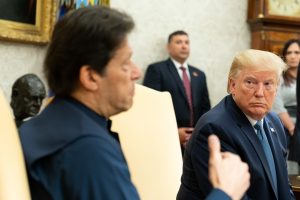Over the last week, several senior members of the Tehreek-e-Taliban Pakistan (TTP) have been killed in Afghanistan. However, it’s not only the Pakistani Taliban that has suffered heavy losses. A senior member of the Baloch Republican Army (BRA), a militant organization known for targeting Pakistan’s interests, was also killed in Iran a few days ago.
The deaths of the Pakistani Taliban and BRA members comes at a time when the United States and the Afghan Taliban are on the cusp of signing a peace agreement in Afghanistan.
The deaths of several anti-Pakistan militant leaders in Afghanistan and Iran are reflective of several previous such developments where Pakistan’s push to assist Washington in Afghanistan was rewarded with an action against groups that Pakistan considers an enemy. If this is the case, then we may see a wider and targeted campaign against the TTP in Afghanistan in the coming weeks and months.
It’s important to note that, Sheikh Khalid Haqqani, who was one of the most senior members of the TTP was killed last week in an operation carried out by the Afghan security forces. American troops were also part of the operation that assassinated Haqqani. “Haqqani embraced martyrdom while fighting with slaves of the United States,” said the TTP in a statement.
Last year, the U.S. State Department declared the Baloch Liberation Army (BLA) a global terrorist organization and announced “it a crime for anyone in the United States to assist the militants and freezing any U.S. assets they may have.” While Pakistan has called for such an action from the United States for years, the decision to designate the BLA a terrorist organization only came at a time when Pakistan began assisting Washington in furthering the Afghan peace process.
In another development that took place in 2018, a U.S. drone strike killed Mullah Fazlullah the former head of the Pakistani Taliban in the northeastern Afghan province of Kunar. For Pakistan, the death of Fazlullah was probably one of the first occasions when the United States showed its willingness to accommodate Pakistan’s interests in Afghanistan.
In the past, policymakers in Pakistan have accused U.S. and Afghan forces of not doing enough to target TTP fighters in Afghanistan. For Pakistan, the Afghan government and Washington have allowed the TTP to gain a foothold in the country in a so-called “tit for tat” move to punish Islamabad for its ties with the Afghan Taliban.
For many, the United States has willingly allowed the TTP to keep some level of presence in Afghanistan for that would allow Washington to offer Islamabad something in return for its cooperation vis-à-vis talks with Afghan Taliban.
On the other hand, so far, Pakistan has gained strategically for its cooperation with the United States.
First, Pakistan’s two key demands of disallowing TTP and BLA sanctuaries in Afghanistan are being met even before a deal is reached between the United States and the Afghan Taliban. The TTP, which has suffered frequent leadership disputes and other organizational challenges, is the weakest it has ever been. The existing pattern of the group’s senior members’ killings in Afghanistan suggests that more deaths will take place in the coming weeks as Washington comes closer to finalizing a deal with the Afghan Taliban.
Second, the existing developments also suggest that any peace deal between the United States and Afghan Taliban would surely allow space for Pakistan’s interests to develop in ways that also involve forbidding the BLA and the TTP any organizational support in Afghanistan or anywhere in the region. Arguably, the United States wouldn’t be averse to any such collaboration as long as Pakistan stays committed to delivering a peace deal in Afghanistan.
Still, a trust deficit between the Pakistani and Afghan leadership persists. This essentially means that the ongoing operations against the TTP in Afghanistan are by and large a decision made by the U.S. political and military command. It’s unclear whether Pakistan will assist the peace process once the U.S. successfully signs a peace deal with the Taliban as the process enters the next stage and an intra-Afghan dialogue begins. This is the part that could become complex given the troubling history of the Pakistan-Afghanistan bilateral relationship.
However, as of now, Pakistan is getting what it wanted: action against the TTP in Afghanistan and Washington’s support for its policy approach in the country.

































